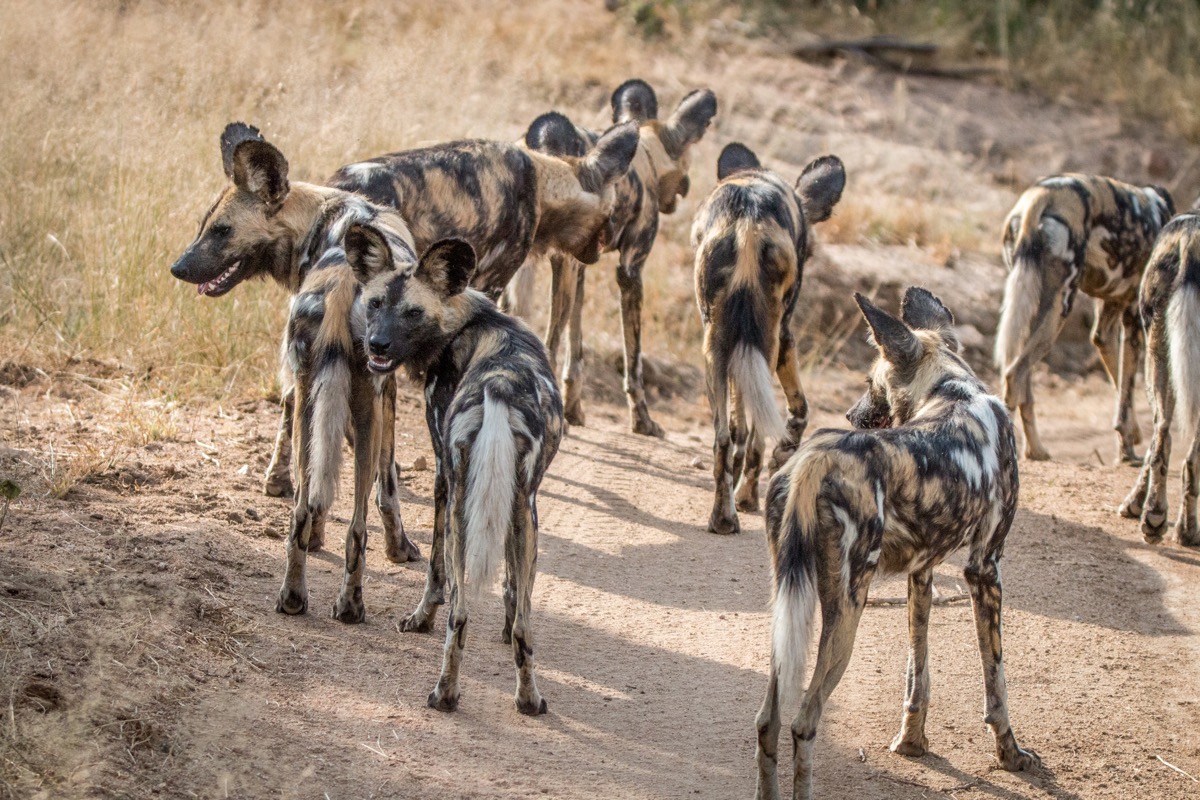African Dogs Vote by Sneezing

African wild dogs (Lycaon pictus) once flourished from the mountainous areas of sub-Saharan regions to the deserts of Africa. Now endangered, these pack-living relatives of domesticated dogs still have a population in Botswana, where researchers like Neil Jordan — a research fellow at the University of New South Wales Sydney and Taronga Conservation Society Australia — study them.
While spending immersive hours of observation in the field is less common among researchers these days, Jordan and his colleagues who work with the Botswana Predator Conservation Trust (BPCT) believe this time is well spent. Such efforts often require long hours of watching resting carnivores and waiting for them to become active, such as by leaving their rest site to go hunting.
"It was during these long waits and subsequent high energy rallies that I first noticed a possible relationship between sneezing and leaving," Jordan said. "I could predict whether or not they were going to move off by listening to the number of sneezes."
To test the unorthodox theory, he and his team collected data from five packs of African wild dogs in and around the Moremi Game Reserve in the Okavango Delta from June 2014 to May 2015. VHF radio collars affixed to at least one dog in each pack allowed the scientists to track the animals.
Through direct observations and video recordings, the researchers documented 68 "social rallies" that occurred among the five packs. Such rallies are the times in which these dogs interact with each other.
The researchers were amazed that the data confirmed Jordan's suspicions: the more sneezes that occurred, the more likely it was that a given pack moved off and started hunting.
"The sneeze acts like a type of voting system," Jordan said.
Get the world’s most fascinating discoveries delivered straight to your inbox.
The findings, published in the journal Proceedings of the Royal Society B, suggest that dogs are not just simply clearing their airways when they sneeze.
Lead author Reena Walker of Brown University said there is evidence supporting that domestic dogs sneeze when they're excited or anxious. Such "unvoiced" or mechanical sounds turn out to be pervasive in dogs and other canids.
"Panting, huffing, and sneezing are signals observed in domestic dogs, coyotes, and jackals that use the exhalation or inhalation of air as a sound to convey an emotional state — messages that range from 'let's play' to 'I see an unfamiliar object' to 'I'm scared,'" Walker said.
"So, finding that sneezes are a signal utilized by African wild dogs is not out of the realm of already understood means of communication in canids," she continued, "but it is the first time we have seen a signal like a sneeze used in the context of group decision making."
Co-author Andrew King of Swansea University added that the sneezes act as a type of quorum, where the sneezes have to reach a certain threshold before the pack changes its activity.
"Quorum-like responses occur in lots of different species," King said. "For example, ants or bees use quorums when moving to new nest sites. In the case of bees, which dance to direct one another to new sites, once the number of bees at a site reaches a quorum, the bees begin an additional recruitment strategy to dancing, known as piping."
Meerkats also use quorums to "vote" by emitting moving calls before heading off to a new foraging patch. Prior research has also determined that white-faced capuchin monkeys emit trills and, if the vocalizations reach a certain threshold, the monkeys will collectively depart.
RELATED: Historic Alaska Wolf Pack May Be Gone
Even bacteria, King said, "use quorums to coordinate gene expression according to the density of their local population," so the process does not necessarily require substantial, if any, brain power.
For African wild dogs, the sneezing acts like democratic voting, such that each individual in a pack may participate and have a vote count. As for human voting, however, the system does not always seem fair.
The researchers noticed if the dominant male and female within each African wild dog pack sneezed, fewer additional sneezes were needed before the group left the resting site.
"However," Walker said, "if the dominant pair were not engaged, more sneezes were needed — approximately 10 — before the pack would move off."
The researchers are not yet certain if the sneezes of dominant and subdominant dogs are acoustically different. How dominance is established in a pack also remains unclear, but age appears to be a factor, with younger dogs tending to be more dominant, Jordan said.
Sneezes are surprisingly important in the animal kingdom. Among humans and many other animals, evidence suggests that sneezes — like yawns — can be contagious, a fact that was not lost on Walker, who sneezed a lot as she watched all of the African wild dog behavior videos.
Scientists are not yet sure why these behaviors are contagious, but the actions could help to safeguard against certain health threats, such as reduced oxygen or added dust in the air. They may also help to promote empathy and bonding among social animals, like humans and dogs.
"I think that there is much we still need to learn about animal communication in general, and the majority of what we do with BPCT is building this understanding to try to develop innovative signal-based tools for conservation management," Jordan said.
African wild dog survival is often threatened when conflicts occur between these animals and humans. For example, food sources at farms, such as animals raised for human consumption and more, can attract the dogs, leading to problems.
BPCT holds promise in preventing such negative encounters with its innovative Bioboundary project. The researchers have learned that the dogs use scent marks to demarcate their territories, so Jordan said they are attempting to understand and manipulate the canine behavior "by tricking them into thinking that the area is already taken" by another pack of dogs.
Originally published on Seeker.


